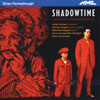Ferneyhough Shadowtime
When is an opera not an opera? When it’s a ‘thought opera’
View record and artist detailsRecord and Artist Details
Composer or Director: Brian Ferneyhough
Genre:
Opera
Label: NMC
Magazine Review Date: 8/2006
Media Format: CD or Download
Media Runtime: 127
Mastering:
Stereo
DDD
Catalogue Number: NMCD123

Tracks:
| Composition | Artist Credit |
|---|---|
| Shadowtime |
Brian Ferneyhough, Composer
Andreas Fischer, Gerschom Scholem, Bass Angelika Luz, Innkeeper, Soprano Anja Paulus, Child I, Soprano Brian Ferneyhough, Composer Ekkehard Abele, Walter Benjamin, Bass Guillermo Anzorena, Young Walter Benjamin, Bass Janet Collins, Henny Gurland, Contralto (Female alto) Jurjen Hempel, Conductor Martin Nagy, Hölderlin, Tenor Mats Scheidegger, Guitar Monika Meier-Schmid, Dora Benjamin, Soprano Neue Vocalsolisten Stuttgart Nicolas Hodges, Piano Nieuw Ensemble Silke Storz, Child II, Soprano |
Author: kYlzrO1BaC7A
Anyone familiar with Brian Ferneyhough’s music might be surprised such an ‘ideas’ composer has attempted opera at all. Although not a stage work in any definable tradition, the seven scenes of Shadowtime – concerning the death and ideas of the German Jewish cultural philosopher Walter Benjamin – pursue a distinct trajectory from the concrete to the abstract. To this end, Charles Bernstein’s libretto might be seen as plumbing the depths of Benjamin’s thought or evading it through intellectual conceit.
It is the first and fifth scenes, holding the overall structure together and so not performable separately, which seem the least successful. Scene 1 recalls the night at the Spanish border in September 1940 when Benjamin chose suicide rather than return to Nazi-occupied France: an incident here superimposed with situations from his own and the literary past, in a synthesis that never quite opens onto even an indirectly dramatic level. Similarly in Scene 5, where Benjamin’s ‘avatar’ encounters figures ranging from Hitler and Einstein to a two-headed phantom of Marxes Karl and Groucho, interrogating him via musical forms spanning the medieval to the Romantic eras. Yet what might succeed conceptually fails to become theatrically provocative.
The other scenes succeed admirably as music. The purely instrumental Scene 2 captures Ferneyhough’s idiom in all its poetic rigour, with Mats Scheidegger’s playing a delight. Scene 3 centres on the superb Stuttgart singers, in aphoristic texts dwelling on metaphysical issues to an often playful degree. Scene 4 is for speaking pianist, his anxious questioning always undercut by his parodistic demeanour. Nicolas Hodges tackles the role with aplomb, as also Scene 6 – its didactic yet diverting epigrams bringing about the final scene: a ‘non-Christian requiem’, with the chorus altered electronically so that both linguistic coherence and musical continuity are dissolved. At the close, only time transformed – though not necessarily transcended – remains.
How successful Shadowtime is depends on how feasible a ‘thought opera’ is deemed to be, and on how acutely Benjamin’s thought has been conveyed. This performance, Jurjen Hempel directing the Nieuw Ensemble with authority, is certainly a success – as is NMC’s presentation. If he has not reinvented opera for the present, Ferneyhough has provided a theatrical basis for music never less than characteristic, and rarely lacking in expressive conviction.
It is the first and fifth scenes, holding the overall structure together and so not performable separately, which seem the least successful. Scene 1 recalls the night at the Spanish border in September 1940 when Benjamin chose suicide rather than return to Nazi-occupied France: an incident here superimposed with situations from his own and the literary past, in a synthesis that never quite opens onto even an indirectly dramatic level. Similarly in Scene 5, where Benjamin’s ‘avatar’ encounters figures ranging from Hitler and Einstein to a two-headed phantom of Marxes Karl and Groucho, interrogating him via musical forms spanning the medieval to the Romantic eras. Yet what might succeed conceptually fails to become theatrically provocative.
The other scenes succeed admirably as music. The purely instrumental Scene 2 captures Ferneyhough’s idiom in all its poetic rigour, with Mats Scheidegger’s playing a delight. Scene 3 centres on the superb Stuttgart singers, in aphoristic texts dwelling on metaphysical issues to an often playful degree. Scene 4 is for speaking pianist, his anxious questioning always undercut by his parodistic demeanour. Nicolas Hodges tackles the role with aplomb, as also Scene 6 – its didactic yet diverting epigrams bringing about the final scene: a ‘non-Christian requiem’, with the chorus altered electronically so that both linguistic coherence and musical continuity are dissolved. At the close, only time transformed – though not necessarily transcended – remains.
How successful Shadowtime is depends on how feasible a ‘thought opera’ is deemed to be, and on how acutely Benjamin’s thought has been conveyed. This performance, Jurjen Hempel directing the Nieuw Ensemble with authority, is certainly a success – as is NMC’s presentation. If he has not reinvented opera for the present, Ferneyhough has provided a theatrical basis for music never less than characteristic, and rarely lacking in expressive conviction.
Discover the world's largest classical music catalogue with Presto Music.

Gramophone Digital Club
- Digital Edition
- Digital Archive
- Reviews Database
- Full website access
From £8.75 / month
Subscribe
Gramophone Full Club
- Print Edition
- Digital Edition
- Digital Archive
- Reviews Database
- Full website access
From £11.00 / month
Subscribe
If you are a library, university or other organisation that would be interested in an institutional subscription to Gramophone please click here for further information.




